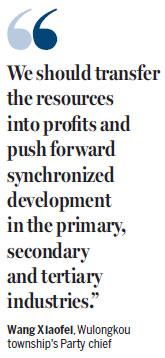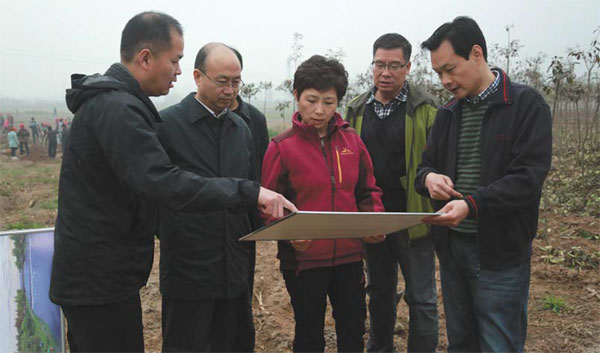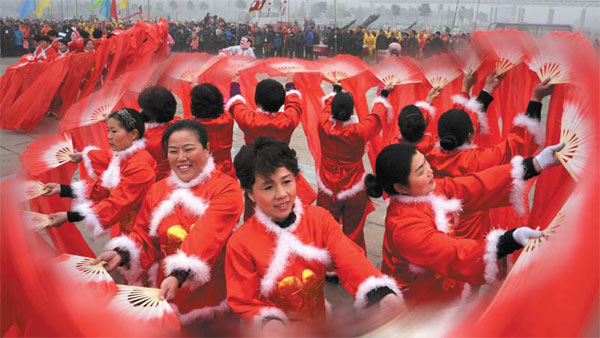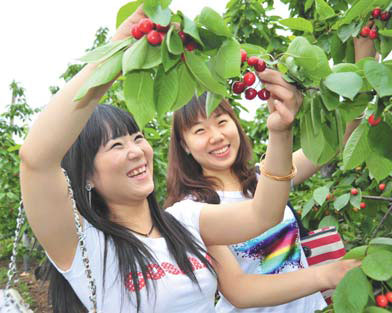Wulongkou makes full use of location and its resources
Wulongkou, a township in Jiyuan, Henan province, has transformed its ideal geographic location and natural resources into productivity as the Chinese economy enters the era of the "new normal" - slower but more sustainable growth - the township's Party chief said.
"We should transfer the resources into profits and push forward synchronized development in the primary, secondary and tertiary industries," Wang Xiaofei said.
The township, on the border of Henan and Shanxi provinces, boasts a sophisticated transportation network that features highways and railways for coal transportation. It is also one of the 50 pilot townships for comprehensive reform in Henan.
A range of large-scale enterprises, including Lianchuang Chemical Co and Qinbei Power Plant, have launched operations in the township's Long-xiang Industrial Park.
Major projects in the park are designed for coordinated development of the enterprises, said Tian Guotao, director of the township's economic office.
For instance, a nanocomposite company produces cement additives using fly ash from the Qinbei Power Plant, and a liquid caustic-soda refining project manufactures downstream products using the caustic soda from the Lianchuang Chemical Co, Tian said.
The township is home to more than 1,090 enterprises that employ a total of 13,000 people. There are 1,061 private enterprises, accounting for nearly 97 percent of the township's total.
With the five pillar industries of electricity, metallurgy, chemical, building materials and papermaking, Wulongkou has ranked No 1 in economic growth among the townships in Jiyuan for several years.
Located at the foot of Taihang Mountain, Wulongkou township has a history dating back to the Qin Dynasty (221-206 BC).
The township got its name, which literally means "the mouths of five dragons", from an irrigation project involving five aqueducts in the Ming Dynasty (1368-1644).
With abundant wildlife resources that include macaques, eagles, various other birds and primeval forest, the Wulongkou Scenic Zone was named one of the top 10 scenic spots in Henan province in 1997.
The scenic zone was designated a national 4A scenic spot - the second-highest ranking - in 2012 and is also a national nature reserve for macaques.
A 158.8-meter sightseeing elevator, which cost more than 40 million yuan ($6.45 million) was recognized by Guinness World Records as the tallest outdoor sightseeing elevator after it went into operation in October 2000. It can take 26 passengers at a time to the top of Taodu Mountain in the scenic zone in just one minute.
In 2014, the administrative committee of the scenic zone invested more than 20 million yuan to improve the infrastructure and services of the scenic zone and promote its image.
The scenic zone was named one of the 30 Model Civilized Scenic Spots in Henan province last year.
The Monkey Park in the scenic zone, built in January 1999, has more than 3,000 macaques. Visitors can also watch performances by a domesticated group of the primates while enjoying the mountainous scenery.
During this year's seven-day Spring Festival holiday that ran from Feb 18 to 24, the scenic zone received more than 60,000 tourists, which generated tourism revenue of more than 2 million yuan, an increase of 290 percent from the same period a year earlier.
"We are glad that so many tourists visited the scenic zone during the Spring Festival holiday. I made more than 10,000 yuan in a day just by selling stuffed macaque toys," said Yuan Ailing, a shopkeeper in the scenic zone.
During this year's Longtaitou Festival, which fell on March 21, more than 80,000 tourists visited the scenic zone and spent more than 200,000 yuan in tourism revenue.
Longtaitou, which translates as "raising the dragon's head", is a festival that falls on the second day of the second lunar month every year and is celebrated in various ways by people around the country.
Residents in the nearby Shankou village also increased their income by selling souvenirs and local agricultural products such as dried persimmon and walnuts.
Driven by the blooming tourism industry, the services of catering, accommodation and parking have become new sources of economic growth for the village.
A hot spring in Wulongkou is well-known for its high temperature and high quality. With an average temperature of 76.8 C and annual output of 1.2 million cubic meters, the hot spring contains rich minerals that are beneficial to human health.
The local government is planning to build a tourism resort fitted with facilities such as hotels, convention centers and healthcare centers that focus on the hot spring's resources.
In addition to industrial growth and tourism, Wulongkou also have made agricultural development and education top priorities.
With more than 2,000 hectares of farmland, Wulongkou has been a land of plenty since ancient times.
The township has built six bases for pollution-free agricultural products and obtained pollution-free accreditations for four products in recent years.
It has also promoted agricultural restructuring and made a major effort to develop leisure tourism based on its rich agricultural resources.
In regard to education, the township has launched a project to provide heating for eight primary and middle schools and granted subsidies for students from impoverished families who enrol in universities.
shibaoyin@chinadaily.com.cn
|
Local officials undertake an inspection in Wulongkou township. Kong Lijie / For China Daily |
|
Foreign tourists are amused by monkeys at a scenic site in the township. Wang Fengli / For China Daily |
|
Amateur groups made up of local residents perform on the street for a gathered audience. Zhao Zhanping / For China Daily |
|
Tourists pick cherries at an local orchard. Lu Guoyu / For China Daily |

(China Daily 04/24/2015 page18)


















